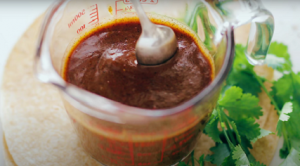Take a culinary journey to the Philippines without leaving your kitchen with this slow-cooked Filipino adobo pulled pork recipe. Known for its rich, savory flavor and tender, melt-in-your-mouth texture, this dish is a fusion of Spanish and Filipino cuisines that uses simple ingredients for an unforgettably delicious result.
Most of the ingredients listed are commonly found in most homes. However, for those who are not accustomed to Asian cooking, you might not have soy sauce and bay leaves on hand. Soy sauce is a staple in Asian cuisine, known for its umami flavor. Bay leaves, on the other hand, are commonly used in Filipino cooking and imparts a unique, slightly floral bitterness that balances the overall flavor of the dish.
Ingredients for Slow Cooked Filipino Adobo Pulled Pork
Pork center loin: This is the main protein of the dish. It is lean but when slow-cooked, it becomes incredibly tender.
Soy sauce: Used for the umami and savory flavor. It also gives the dish its characteristic dark color.
Apple cider vinegar: This adds a tangy flavor which balances the salty soy sauce.
Water: Used to dilute the strong flavors and make enough sauce.
Garlic: Gives a savory and aromatic boost to the dish.
Peppercorns: These add gentle heat and a pop of flavor.
Bay leaves: These impart a unique, slightly floral bitterness that balances the flavor of the dish.
Jalapeno: Adds a spicy kick which is optional.
Scallions: Used as garnish and adds a fresh, slightly sweet flavor.
One reader, Betta Hu says:





This slow-cooked Filipino adobo pulled pork recipe is a game-changer! The flavors are rich and savory, and the meat is incredibly tender. The combination of soy sauce, vinegar, and garlic creates a mouthwatering aroma that fills the kitchen. It's a must-try for anyone who loves delicious, comforting food.
Key Techniques for Perfecting Slow Cooked Filipino Adobo Pulled Pork
How to slow cook the pork: The pork should be cooked on low heat for 6 to 8 hours in the crock pot, ensuring it is turned over halfway through the cooking process to ensure even cooking and flavor absorption.
How to shred the pork: After the initial cooking, remove the pork from the crock pot and use two forks to shred it. Then, return the shredded pork to the crock pot for an additional hour to allow the flavors to infuse into the meat.
How to serve the dish: The adobo pulled pork can be served over rice and topped with chopped scallions to enhance the flavor and presentation.
How To Make Slow Cooked Filipino Adobo Pulled Pork
Filipino adobo is noted for its acidic hints from vinegar and soy sauce. This slow cooker pulled pork pulls inspiration from the classic Asian staple.
Serves:
Ingredients
- 1¾lbslean pork center loin
- ⅓cuplow sodium soy sauce
- ⅓cupapple cider vinegar
- ½cupwater
- 5clovesgarlic,crushed
- 6ground peppercorns
- 6bay leaves
- 1jalapeno,chopped, optional
- 2tbspscallions,chopped, for garnish
Instructions
-
Place pork, soy sauce, vinegar, water, garlic, peppercorns, bay leaves, and optional jalapeño in the crock pot.
-
Cover and set to Low heat for 6 to 8 hours turning over half way through cooking.
-
Remove the pork, shred with 2 forks, and put it back in the crock pot for 1 more hour to let the flavor get into the meat.
-
Discard bay leaves and serve over rice and top with chopped scallions. Enjoy!
Nutrition
- Calories: 178.05kcal
- Fat: 6.53g
- Saturated Fat: 2.24g
- Monounsaturated Fat: 2.92g
- Polyunsaturated Fat: 0.73g
- Carbohydrates: 2.30g
- Fiber: 0.43g
- Sugar: 0.25g
- Protein: 25.65g
- Cholesterol: 66.90mg
- Sodium: 497.98mg
- Calcium: 35.01mg
- Potassium: 516.59mg
- Iron: 1.45mg
- Vitamin A: 5.86µg
- Vitamin C: 4.28mg
Expert Technique Tip for Mastering Filipino Adobo Pulled Pork
When shredding the pork, it's best to let it cool slightly before handling. This makes it easier to shred and also allows the meat to absorb more of the adobo sauce when returned to the crock pot. Additionally, using two forks to shred the meat will give you better control and result in more evenly shredded pieces.
Time-Saving Tips for Making This Delicious Recipe
Prep ahead: Marinate the pork and prepare the ingredients the night before, so you can simply place everything in the slow cooker in the morning.
Use a slow cooker liner: This will make cleanup a breeze and save time on scrubbing the pot.
Invest in a meat shredding tool: Using a meat shredding tool can significantly speed up the process of shredding the pork.
Double the recipe: Make a larger batch and freeze the extra pulled pork for future quick and easy meals.
Utilize a pressure cooker: If you're short on time, consider using a pressure cooker to speed up the cooking process.
Substitute Ingredients For Slow Cooked Filipino Adobo Pulled Pork Recipe
lean pork center loin - Substitute with pork shoulder: Pork shoulder is a fattier cut that will result in a more tender and flavorful pulled pork.
low sodium soy sauce - Substitute with coconut aminos: Coconut aminos is a soy-free alternative that provides a similar umami flavor and is suitable for those with soy allergies or sensitivities.
apple cider vinegar - Substitute with white wine vinegar: White wine vinegar offers a milder flavor compared to apple cider vinegar, which can work well in this recipe without overpowering the other ingredients.
garlic - Substitute with garlic powder: If fresh garlic is not available, garlic powder can be used as a substitute, although the flavor profile may be slightly different.
ground peppercorns - Substitute with black pepper: Black pepper can be used as a substitute for ground peppercorns, providing the same peppery flavor to the dish.
jalapeno - Substitute with serrano pepper: Serrano pepper can be used as a substitute for jalapeno, offering a similar level of heat and flavor to the dish.
scallions - Substitute with chives: Chives can be used as a substitute for scallions, providing a mild onion flavor and a similar visual appeal to the dish.
How to Beautifully Present Slow Cooked Filipino Adobo Pulled Pork
Elevate the plating: When presenting the slow-cooked Filipino adobo pulled pork, focus on creating a visually appealing plate. Consider using elegant, minimalist plating techniques to showcase the succulent pork and its rich, flavorful sauce.
Incorporate vibrant colors: Introduce pops of color to the plate with complementary garnishes such as fresh cilantro or thinly sliced red chili peppers. These elements not only enhance the visual appeal but also add a layer of complexity to the dish.
Emphasize texture: Add a textural element to the presentation by incorporating a delicate cabbage slaw or pickled radishes. The contrast in textures will provide a delightful sensory experience for the diners.
Utilize negative space: Embrace the concept of negative space on the plate to draw attention to the star of the dish – the tender pulled pork. Allow the empty space to create a sense of balance and sophistication in the overall presentation.
Artful drizzling: Consider drizzling a reduction of the adobo sauce around the plate, using a steady hand to create an artistic and appetizing presentation. This technique adds a touch of finesse to the dish.
Garnish with microgreens: Sprinkle a few carefully placed microgreens over the pulled pork to introduce a fresh, herbaceous note and elevate the visual appeal of the dish.
Use elegant serving ware: Select refined, high-quality serving ware that complements the sophistication of the dish. Opt for minimalist designs and neutral tones to allow the vibrant colors of the food to take center stage.
Attention to detail: Pay close attention to the finer details, such as wiping the edges of the plate to ensure a clean presentation and using precise, intentional placement of each element on the plate.
Essential Tools for Making Filipino Adobo Pulled Pork
- Crock pot: A slow cooker used for long, slow cooking of the pork to tender perfection.
- Forks: Used for shredding the slow-cooked pork.
- Knife: For mincing the garlic and slicing the jalapeño.
- Cutting board: To provide a stable surface for chopping and preparing ingredients.
- Measuring cups: For accurately measuring the soy sauce, vinegar, and water.
- Measuring spoons: For precise measurement of the ground peppercorns.
- Saucepan: To heat the adobo sauce ingredients before adding them to the crock pot.
- Tongs: For turning the pork over halfway through cooking.
- Serving platter: To present the pulled pork adobo when serving.
Proper Storage and Freezing Methods for Slow Cooked Filipino Adobo Pulled Pork
- Let the filipino adobo pulled pork cool completely before storing it in an airtight container or freezer bag.
- Divide the cooled pulled pork into portion-sized containers or freezer bags for easy reheating and to avoid wasting any leftovers.
- If using freezer bags, remove as much air as possible before sealing to prevent freezer burn.
- Label the containers or bags with the date and contents for easy identification.
- Store the adobo pulled pork in the refrigerator for up to 4 days.
- To freeze, place the sealed containers or bags in the freezer, where they will keep for up to 3 months.
- When ready to eat, thaw the frozen pulled pork in the refrigerator overnight.
- Reheat the thawed or refrigerated adobo pulled pork in a saucepan over medium heat, stirring occasionally, until heated through. You can also reheat it in the microwave, stirring every 30 seconds to ensure even heating.
- If the reheated pulled pork seems dry, add a splash of water, chicken broth, or reserved cooking liquid to help moisten it.
How To Reheat Leftover Slow Cooked Filipino Adobo Pulled Pork
Reheat the pulled pork in a slow cooker on low heat for 1-2 hours, stirring occasionally, until heated through. This method helps to retain the moisture and tenderness of the meat while allowing the flavors to meld together even more.
Place the leftover adobo pulled pork in a covered microwave-safe dish and add a splash of water or chicken broth. Microwave on high for 1-2 minutes, stirring every 30 seconds, until the pork is heated through. The added liquid will help prevent the meat from drying out during reheating.
Preheat your oven to 350°F (175°C). Transfer the leftover pulled pork to a baking dish, cover with aluminum foil, and bake for 15-20 minutes, or until the pork is heated through. For a crispy exterior, remove the foil during the last 5 minutes of reheating.
Heat a large skillet or wok over medium-high heat. Add a small amount of oil and stir-fry the leftover adobo pulled pork for 3-5 minutes, or until heated through and slightly crispy. This method is perfect for incorporating the pork into a new dish, such as fried rice, tacos, or sandwiches.
Create a makeshift steamer by placing a heatproof plate on a trivet or steamer basket in a large pot with a small amount of water. Place the leftover pulled pork on the plate, cover the pot, and steam over medium heat for 5-10 minutes, or until the pork is heated through. This gentle reheating method helps to maintain the pork's moisture and texture.
Interesting Trivia About Slow Cooked Filipino Adobo Pulled Pork
The Filipino adobo pulled pork recipe is a popular dish in the Philippines and is often considered the country's national dish. It is traditionally made with pork or chicken, marinated in a mixture of soy sauce, vinegar, and garlic. The slow cooking process allows the flavors to meld together, resulting in a tender and flavorful dish. The use of bay leaves and peppercorns adds a unique depth of flavor to the dish. This cooking method was originally used as a way to preserve meat in the tropical climate of the Philippines. The dish is often served with rice, and the tangy, savory flavors make it a favorite among many.
Budget-Friendly: Is This Recipe Economical for Home Cooking?
The slow-cooked Filipino adobo pulled pork recipe is highly cost-effective for a household. The use of lean pork center loin makes it an affordable choice, and the minimal additional ingredients are budget-friendly. The dish is packed with flavor and yields a satisfying meal for a family of four. The approximate cost for this recipe is around $15, making it an economical and delicious option for home cooking. Overall Verdict: 9/10
Is Slow Cooked Filipino Adobo Pulled Pork Healthy or Unhealthy?
This Filipino adobo pulled pork recipe is a healthier twist on a classic dish. The lean pork center loin is a great source of protein, while the soy sauce and apple cider vinegar provide a flavorful punch without adding excessive calories. The garlic and jalapeno add a nice kick of flavor and some potential health benefits, such as boosting the immune system and aiding digestion.
However, there are a few areas where this recipe could be improved to make it even healthier:
- Reduce the sodium content by using a low-sodium soy sauce or replacing some of the soy sauce with a low-sodium broth
- Increase the vegetable content by adding some sliced onions, bell peppers, or carrots to the slow cooker
- Serve the pulled pork over a bed of leafy greens or cauliflower rice instead of white rice to increase the fiber content and reduce the carbohydrate load
- Use a leaner cut of pork, such as pork tenderloin, to further reduce the fat content
To make this recipe even more nutritious, you could also:
- Add some chopped fresh herbs, such as cilantro or parsley, for an extra burst of flavor and nutrients
- Serve the pulled pork with a side of steamed or roasted vegetables, such as broccoli or green beans
- Use a whole grain or legume-based tortilla or bun instead of white rice for a more fiber-rich and satisfying meal
- Experiment with different spice blends or marinades to keep things interesting and add some variety to your diet
Editor's Opinion on Slow Cooked Filipino Adobo Pulled Pork
This slow-cooked Filipino adobo pulled pork recipe is a delightful fusion of flavors. The combination of soy sauce, vinegar, and aromatic spices creates a rich and savory marinade for the lean pork center loin. The slow cooking process allows the meat to become tender and infused with the bold adobo flavors. The addition of jalapeño adds a subtle kick, while the scallions provide a fresh finish. Serving this succulent pulled pork over rice creates a comforting and satisfying meal. It's a perfect dish for anyone looking to experience the delicious flavors of Filipino cuisine.
Enhance Your Slow Cooked Filipino Adobo Pulled Pork Recipe with These Unique Side Dishes:
Tasty Alternatives to Slow Cooked Filipino Adobo Pulled Pork
Appetizer and Dessert Suggestions for Slow Cooked Filipino Adobo Pulled Pork
Why trust this Slow Cooked Filipino Adobo Pulled Pork Recipe:
This recipe for slow-cooked Filipino adobo pulled pork is a testament to the rich and flavorful tradition of Filipino cuisine. The combination of low sodium soy sauce, apple cider vinegar, and aromatic spices like garlic and bay leaves creates a tantalizing marinade that infuses the lean pork center loin with unparalleled taste. The slow cooking process ensures that the meat becomes tender and succulent, allowing the flavors to meld beautifully. With the added touch of jalapeño for a hint of heat and scallions for freshness, this recipe promises a truly authentic and delightful dining experience.
Was this page helpful?
Have your own special recipe to share? Submit Your Recipe Today!
















